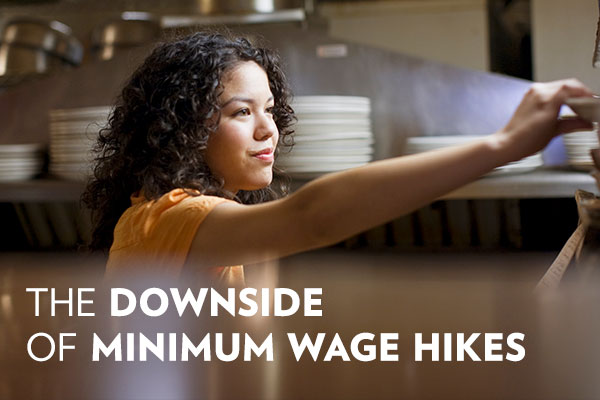Media

Let’s Shoot for “Maximum Wages” All Around
My family knows first-hand the effects of the minimum wage—on consumers and workers alike.
In January 2014, New Jersey raised its minimum wage, and workers celebrated their increased wages. However, this celebration was short-lived as several small business owners in my home state faced higher costs in every aspect of their business structure. I remember my father, uncle, and grandfather being more stressed than ever, working longer hours themselves, and struggling to shoulder the rising cost of goods.
I realized that by requiring all businesses to increase their wages, legislators were not only killing jobs for the low-wage earners they hoped to protect, but also increasing the cost of living for everyone in the state.
A recent report by Pennsylvania’s Independent Fiscal Office (IFO) confirms increasing the minimum wage to $12 an hour in Pennsylvania will eliminate around 34,000 jobs and increase the price of goods.
Even more devastating, 30,000 of these people predicted to lose their jobs are the very minimum wage workers this policy is supposed to help.
Minimum wage jobs are typically a first step into the workforce. As the IFO highlights, people aren’t earning minimum wage for long periods of time; they either earn salary increases or pursue better paying positions. Ultimately, low-wage earners make up only about 2.4 percent of the state’s total employed population.
In other words, minimum wage jobs are just the first rung on a ladder to “maximum wage” positions! But if we remove that rung, fewer workers will make it to the top—or even enter the workforce at all.
When the minimum wage is increased, entry-level jobs are the first to be eliminated by small businesses struggling to pay the increased wages, making entry-level positions more sparse. Meanwhile, larger corporations simply create self-service kiosks or outsource tasks to bypass the minimum wage.
This policy is supposed to help, but instead it harms workers and small businesses. Our legislators should learn from the adverse effects of Seattle’s Minimum Wage Ordinance. After the increase, minimum wage earners received $125 less each month due to reduced hours. Again, artificially mandating the cost of workers doesn’t harm just one business; it inflates the price of goods and services across the entire economy.
All of this looks quite negative, but at least we don’t have to worry about this for awhile, right? Wrong. In his budget address, Governor Wolf proposed a $12 minimum wage this summer, with annual fifty-cent increases until 2025.
If the governor really wants to improve the earnings of workers, he should lower taxes to attract more businesses to Pennsylvania. More demand for labor means less competition and higher wages. Or, he could focus on occupational licensing reform to allow more low-income individuals to find lasting employment.
I consider my family lucky—we withstood the government mandates thrown at us. But other small businesses in New Jersey have not been as fortunate. In Pennsylvania, let’s shoot for maximum wage by keeping jobs open so more workers can climb that ladder to the top.